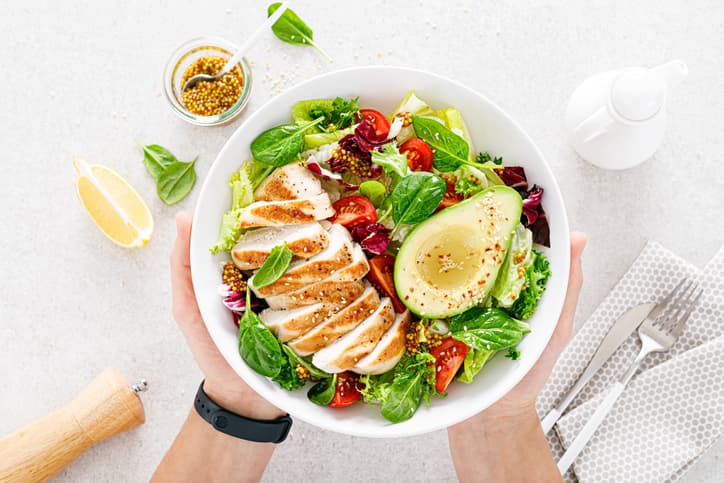Getting the proper nutrition by eating a well-balanced, healthy diet is important for people of all ages. However, as we age and get older, our nutritional needs change. So, it is essential to ensure our diets reflect these changes.
Why is nutrition for older adults important?

As a caregiver, ensuring the people you care for get the right nutrients with the proper mix of proteins, carbohydrates, minerals, fats, and vitamins is essential. In addition, good nutrition can help reduce the risk of and prevent certain diseases, including hypertension, type 2 diabetes, osteoporosis, and heart disease.
As people age, they still need to get plenty of nutrients to remain healthy, even if they eat smaller meals with fewer calories. Furthermore, the dietary needs of elderly adults will vary. As such, when planning meals, you need to account for each person’s specific needs.
Why can seniors have difficulties eating healthy as they age?

Seniors can experience different life changes that will affect the ability to meet the nutrition needs for older adults and eat healthy meals, including:
- Changes in their home life, such as living alone due to the loss of their spouse or partner or their adult children moving out.
- Developing mobility problems. When they have problems getting around, it can make it more difficult to want to cook and prepare healthy meals.
- Changes in their overall health. Health issues can make it harder for some people to cook healthy or feed themselves.
- Changes to their sense of smell or taste. These changes can alter how food smells or tastes, so food may no longer smell or taste good.
- Changes to their income. It can become challenging when they do not have as much money to spend on food, which often results in fewer healthy options.
- Starting a new medication. Certain medications can affect appetite or have side effects that make one feel nauseous. They can also change how food tastes.
- Difficulties chewing and swallowing food. When people have problems eating, they will not eat as often or look for foods that may not be as nutritious.
If you are looking for a team with personalized care and services for a loved one, contact us today.
What are some nutrition tips for older adults to eat healthy?

To help your clients eat nutritious meals and stay healthy, follow theses nutrition recommendations for older adults:
- Help them plan their meals and snacks. By creating meal plans, they will have a say in their meals, while you can help direct them to make healthier choices.
- Encourage them to eat foods with the nutrients they need. Fresh fruits and vegetables, whole grains, low-fat dairy products, seafood, poultry, lean meats, eggs, nuts, seeds, and beans are all good choices depending on their specific nutritional needs.
- Help them pick foods that are low in fat and low in cholesterol. You want to recommend that they avoid foods high in fats, especially saturated and trans fats.
- Help them replace bad snacks with good snacks. Chips, cookies, ice cream, soda, and candy are tempting snacks many seniors enjoy. However, you should have them consider better choices, like fruits, vegetables, nuts, and seeds.
- Encourage them to drink plenty of water. Some people forget to drink plenty of water to remain hydrated. When people become dehydrated, they can experience stomach cramps, which will cause them not to want to eat.
- Help them remain physically active. Regular exercise is an essential part of a well-balanced diet. Plus, it can help stimulate the appetites in the elderly.
For more detailed information, see the CDC nutrition for older adults.
What else can caregivers do when their clients have trouble getting the nutrition they need?

There can be other issues or problems that you may not be fully aware of, even when you are trying to help them get the nutrition they need. You may need to talk to your client and ask them what you can do to ensure they eat healthily.
- Your client says they are tired of eating alone. Schedule shared meals with some of their friends or family. If allowed, you could eat a meal with your client and provide them the companionship they want. You could also look into shared meals and potlucks at local senior centers, churches, or community centers.
- Your client says their food doesn’t smell or taste good. Review any new medications they may have started and potential side effects. Ask them if it is specific foods or all types of foods. Have them try foods they rarely eat or ones they do not like, as their taste buds may have changed.
- Your client complains it is difficult to chew or swallow their food. IHelp your client schedule an appointment with their dentist for teeth-related problems or their doctor for swallowing difficulties.
- Your client says they cannot smell or taste the food, so it is not appetizing. Have them add some brightly colored foods or different textures to see if this helps.
- Your client tells you they get full quickly. Have them eat healthy snacks or several smaller meal portions throughout the day to ensure they get the required nutrients.
- Your client says it is challenging to cook and prepare meals. You could assist them by making meals they can reheat in the microwave later. You could also have them sign up for Meals on Wheels or another senior meal delivery program.
- Your client says they have problems holding utensils to eat. Have them consult with an occupational therapist who can make suggestions to make it easier for them to eat.
- Your client says they lack the income to afford healthy foods. Help them sign up for food assistance programs. There are plenty of food assistance programs for seniors to ensure they get the food and nutrition they need.
Related: Nutrition and Meal Planning for Seniors in the Southwest
Nutrition Programs for Older Adults
When you have clients that need help getting the nutrition they need, the caring team at Haven Health has assisted living and skilled nursing nutrition programs for older adults with short-term and long-term care options.
Please feel free to contact us to learn more about our nutrition programs and how we can help.
Sources:
American Heart Association. Top 10 Cooking Tips for Caregivers.
Centers for Disease Control. Food Service Guidelines.
NIH: National Library of Medicine. Nutrition Concerns for Aging Populations.
U.S. Department of Health and Human Services. Nutrition as We Age: Healthy Eating with the Dietary Guidelines.